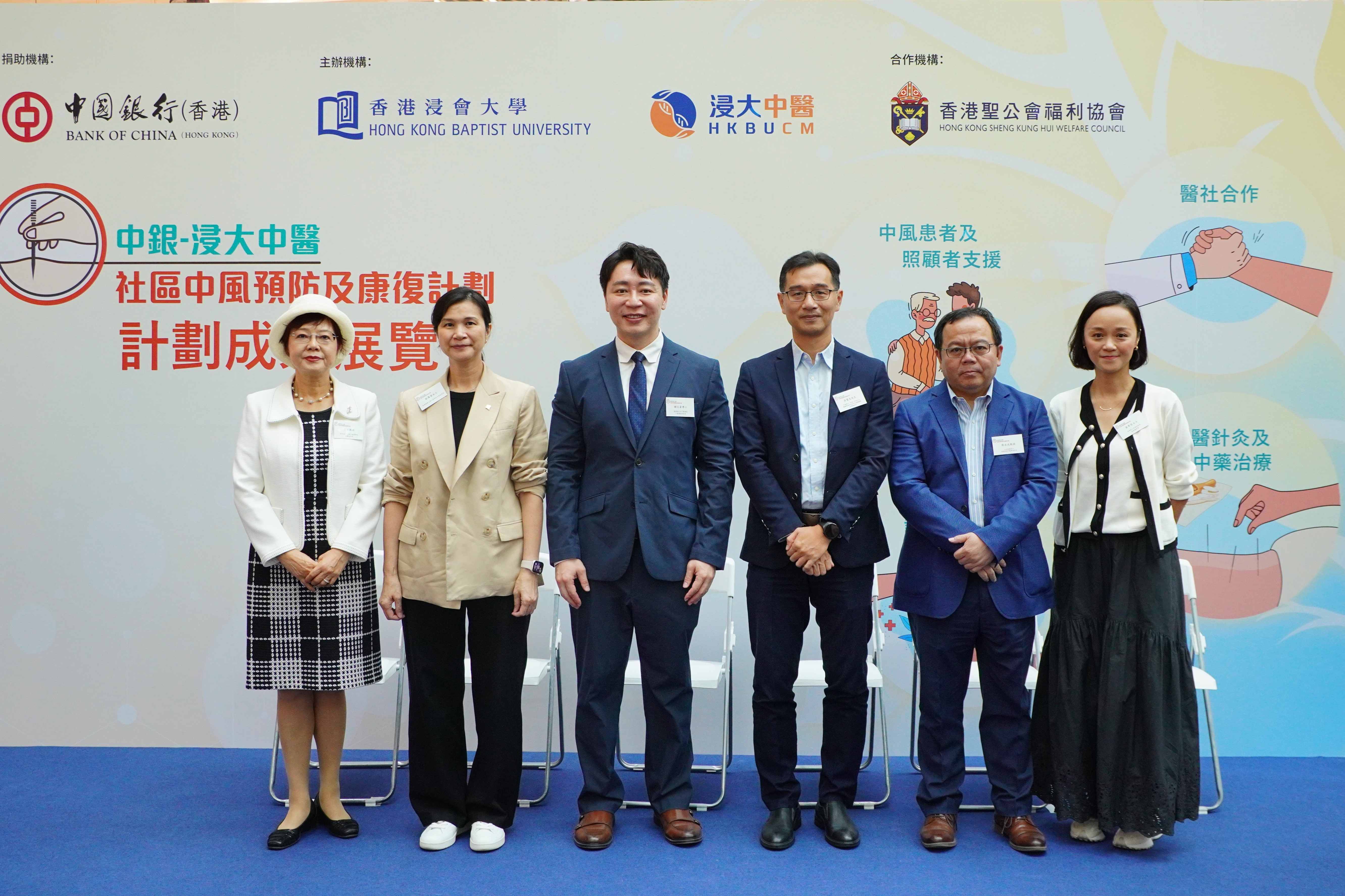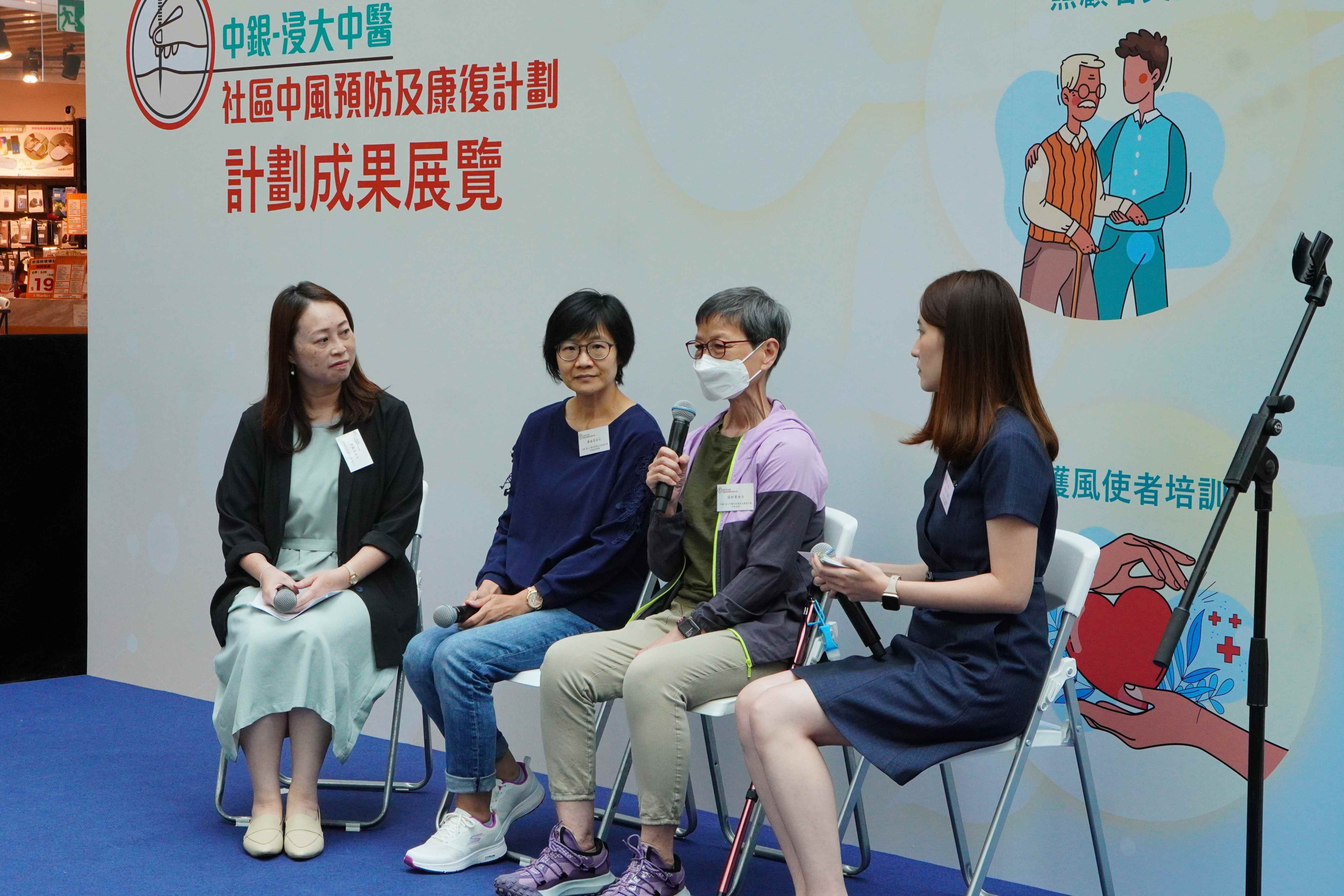Press Release
BOC–HKBU Chinese Medicine Community Stroke Prevention and Rehabilitation Scheme records 95,000 beneficiaries
Saturday, 26 October 2024
Hong Kong Baptist University (HKBU) and the Hong Kong Sheng Kung Hui Welfare Council (the Welfare Council) launched the four-year “BOC-HKBU Chinese Medicine Community Stroke Prevention and Rehabilitation Scheme” since 2020 with the support of a generous donation from the Bank of China (Hong Kong). The scheme has provided more than 31,000 Chinese medicine treatment service sessions to elderly stroke patients and people with medium to high risk of stroke. Together with other channels including talks, website and various trainings, the entire scheme recorded a total of nearly 95,000 beneficiaries.
The scheme will come to a close by the end of October. An exhibition to share the scheme’s results is held today and tomorrow (26 and 27 October) in a shopping mall in Tseung Kwan O. Officiating guests of today’s exhibition included Dr Chung Chi-ho, Commissioner for Chinese Medicine Development of the Chinese Medicine Unit of the Health Bureau; Mr Peter Ng, Assistant General Manager of the Public Sector and Institutional Business Department of the Bank of China (Hong Kong); Professor Chan Wing-kwong, member of the Legislative Council; Ms Christine Chow, Vice-President (Administration) and Secretary of HKBU; Professor Li Min, Executive Associate Dean of the School of Chinese Medicine at HKBU; and Ms Wong Chui-yan, Assistant Director of the Hong Kong Sheng Kung Hui Welfare Council.
In her speech on behalf of the School of Chinese Medicine at HKBU, Professor Li Min thanked the Bank of China (Hong Kong) for supporting the collaboration between the School and the Welfare Council to implement the scheme. She also thanked the collaborating units, participating Chinese medicine practitioners, social workers and staff, as well as the patients, caregivers, and the public who participated in the scheme for their trust in the team. She said, “The School of Chinese Medicine at HKBU will continue to support and initiate various community Chinese medicine services, making greater contributions to the health of the public and the development of society.”
Ms Wong Chui-yan said the “BOC-HKBU Chinese Medicine Community Stroke Prevention and Rehabilitation Scheme” supported stroke patients and their families through collaboration between the medical sector and the community. Patients received free acupuncture and Chinese medicine treatment services, and social workers provided them with comprehensive support. The scheme also emphasised the importance of community education on stroke prevention, and helped high-risk individuals and the elderly prevent strokes through talks, website, screening questionnaires and ophthalmoscopy. “Senior ambassadors for stroke prevention” also shared stroke prevention information with the community.
Throughout the course of the scheme’s implementation, nearly 470 patients recovering from stroke received a total of more than 28,000 times of acupuncture, massage therapy and Chinese medicine treatment sessions at five treatment centres under the Welfare Council. After receiving treatments, the patient’s self-care abilities, cognitive abilities and neurological functions were significantly improved, resulting in an enhanced quality of life.
Ms Mak, a family member of a stroke patient, said at the event that her father suffered a stroke in July 2023, and her family was worried about his recovery after being discharged from the hospital. They were thankful to have participated in the scheme and received free traditional Chinese medicine treatment services. After about two months of treatment, his father’s mobilities and speech abilities improved significantly, and he was able to walk using a walking frame.
Ms Mak thanked the scheme for arranging designated Chinese medicine practitioners to treat patients. This enables better monitoring of patients’ conditions continuously, which in turn enhances the patients’ confidence in receiving treatments. She asserted that the scheme has a speedy application and approval procedure, and can provide timely support to stroke patients and their families.
The scheme also provided free Chinese medicine treatment for stroke prevention and follow-up observation to more than 1,000 eligible people at high risk of stroke. Data shows that people with constitutions of phlegm-dampness and blood stasis are significantly associated with a higher risk of stroke. After receiving four months of Chinese herbal tea treatment, the body constitutions of such participants improved, thereby reducing their risk of stroke.
The scheme also trained 138 elders to serve as “senior ambassadors for stroke prevention” to promote stroke prevention information to community residents. It also organised more than 200 talks, and set up a website to provide the public with information on stroke prevention using Chinese medicine, so as to raise society’s awareness of stroke prevention.
- End -


